Lithium sulfur battery review
Home » » Lithium sulfur battery reviewYour Lithium sulfur battery review images are available. Lithium sulfur battery review are a topic that is being searched for and liked by netizens today. You can Get the Lithium sulfur battery review files here. Find and Download all royalty-free images.
If you’re looking for lithium sulfur battery review images information linked to the lithium sulfur battery review topic, you have visit the ideal site. Our site frequently gives you suggestions for refferencing the maximum quality video and image content, please kindly search and find more enlightening video articles and graphics that fit your interests.
Lithium Sulfur Battery Review. We can summarize this review as the following. The advanced lithium-sulfur battery is considered as one of the most promising candidates for high-performance energy storage material on account of its high theoretical specific capacity 1675 mAh g 1 and energy density 2600 Wh kg 1. However the practical application of lithium-sulfur battery is still greatly impeded by the low Coulombic. Lithiumsulfur LiS batteries have received a lot of attention as a next-generation energy storage system because of its high theoretical specific energy density of 2500 W h kg 1 and theoretical specific capacity of 1675 mA h g 1 1 3.
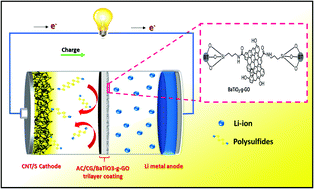
We can summarize this review as the following. Lithium sulfur LiS batteries are one of the most promising next generation battery chemistries with potential to achieve 500600 W h kg 1 in the next few years. Lithiumsulfur LiS batteries with a theoretical energy density of 2567 Wh kg 1 are very promising nextgeneration energy storage systems but suffer from the insulativity of sulfur and Li 2 S the shuttle effect due to the dissolution and migration of polysulfides and the lithium dendrite issue. Therefore as an extension of this review we here briefly summarize the progress made when applying encapsulated sulfur in an aqueous electrolyte battery chemistry. However some issues such as the low conductivity and the large volume variation of sulfur as well as the formation of polysulfides during cycling are yet to be addressed before LSBs can become an actual reality. Lithium-sulfur batteries can enable efficient electric transportation such as in unmanned aircrafts electric buses trucks and locomotives in addition to large-scale energy storage devices.
Normally lithium-ion batteries contain just 05 to 07 lithium particles per atom while Lithium Sulfur takes into allows a lot higher lithium storage capacity.
Lithiumsulfur LiS batteries have received a lot of attention as a next-generation energy storage system because of its high theoretical specific energy density of 2500 W h kg 1 and theoretical specific capacity of 1675 mA h g 1 1 3. The advanced lithium-sulfur battery is considered as one of the most promising candidates for high-performance energy storage material on account of its high theoretical specific capacity 1675 mAh g 1 and energy density 2600 Wh kg 1. Comprehensive Nanoscience and Nanotechnology Second Edition 2019. Sulfur also has the advantages of low-cost and high abundance. Lithiumsulfur batteries LSBs are regarded as a new kind of energy storage device due to their remarkable theoretical energy density. I Carbon materials are excellent candidates for sulfur storing in Li S batteries due to their relatively high conductivity and high efficiency in immobilizing polysulfides upon cycling.
 Source: sciencedirect.com
Source: sciencedirect.com
In the case of using sulfur as the cathode material the configuration of two compartment cell is applied to enable the use of an aqueous electrolyte at the sulfur cathode and an organic electrolyte at the lithium metal anode 245. Lithiumsulfur LiS batteries with a theoretical energy density of 2567 Wh kg 1 are very promising nextgeneration energy storage systems but suffer from the insulativity of sulfur and Li 2 S the shuttle effect due to the dissolution and migration of polysulfides and the lithium dendrite issue. Yet understanding the underlying mechanisms of operation remains a major obstacle to their continued improvement. Lithiumsulfur batteries LSBs are regarded as a new kind of energy storage device due to their remarkable theoretical energy density. Lithium-sulfur battery is regarded as one of the promising next-generation energy storage to electrical and portable devices thanks to its extremely high theoretical capacity energy density good environmental protection and low cost.
 Source: pubs.rsc.org
Source: pubs.rsc.org
We can summarize this review as the following. Lithium sulfur battery is one of promising candidates for next-generation energy storage device due to the sulfur cathode material with low cost and nontoxicity and super high theoretical energy density nearly 2600 Wh kg1 6365. Lithiumsulfur LiS batteries with a theoretical energy density of 2567 Wh kg 1 are very promising nextgeneration energy storage systems but suffer from the insulativity of sulfur and Li 2 S the shuttle effect due to the dissolution and migration of polysulfides and the lithium dendrite issue. The primary difficulties of Lithium Sulfur batteries are the low conductivity of sulfur and its monstrous volume change after discharging. Lithium sulfur LiS batteries are one of the most promising next generation battery chemistries with potential to achieve 500600 W h kg 1 in the next few years.
 Source: researchgate.net
Source: researchgate.net
I Carbon materials are excellent candidates for sulfur storing in Li S batteries due to their relatively high conductivity and high efficiency in immobilizing polysulfides upon cycling. Particularly basic insights into the interfacial reactions strategies for mesoscale assembly unique architectures and configurational innovation in the cathode anode and separator are under specific concerns. Normally lithium-ion batteries contain just 05 to 07 lithium particles per atom while Lithium Sulfur takes into allows a lot higher lithium storage capacity. We can summarize this review as the following. Lithiumsulfur LiS batteries with a theoretical energy density of 2567 Wh kg 1 are very promising nextgeneration energy storage systems but suffer from the insulativity of sulfur and Li 2 S the shuttle effect due to the dissolution and migration of polysulfides and the lithium dendrite issue.
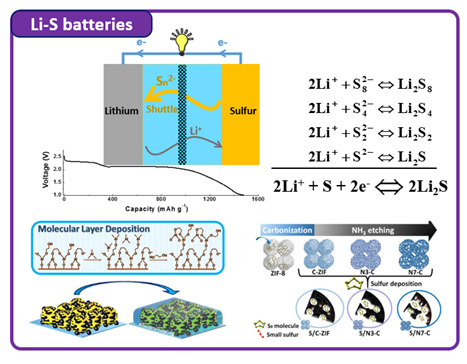 Source: eng.uwo.ca
Source: eng.uwo.ca
However the practical application of lithium-sulfur battery is still greatly impeded by the low Coulombic. A review of biomass materials for advanced lithiumsulfur batteries Huadong Yuan Tiefeng Liu Yujing Liu Jianwei Nai Yao Wang Wenkui Zhang and Xinyong Tao High energy density and low cost make lithiumsulfur LiS batteries famous in the field of energy storage systems. Sulfur also has the advantages of low-cost and high abundance. As a prospective nextgeneration energy storage solution lithiumsulfur batteries excel at their economical attractiveness sulfur abundance and electrochemical performance high energy density 2600 Wh kg 1. Particularly basic insights into the interfacial reactions strategies for mesoscale assembly unique architectures and configurational innovation in the cathode anode and separator are under specific concerns.
 Source: sciencedirect.com
Source: sciencedirect.com
Normally lithium-ion batteries contain just 05 to 07 lithium particles per atom while Lithium Sulfur takes into allows a lot higher lithium storage capacity. Lithium sulfur LiS batteries are one of the most promising next generation battery chemistries with potential to achieve 500600 W h kg 1 in the next few years. Normally lithium-ion batteries contain just 05 to 07 lithium particles per atom while Lithium Sulfur takes into allows a lot higher lithium storage capacity. Lithium-sulfur battery one of the most prominent and widely studied batteries takes sulfur as the cathode which has rich reserves in the earth. Lithiumsulfur batteries LSBs are regarded as a new kind of energy storage device due to their remarkable theoretical energy density.
 Source: researchgate.net
Source: researchgate.net
Normally lithium-ion batteries contain just 05 to 07 lithium particles per atom while Lithium Sulfur takes into allows a lot higher lithium storage capacity. Comprehensive Nanoscience and Nanotechnology Second Edition 2019. Lithium-sulfur battery is regarded as one of the promising next-generation energy storage to electrical and portable devices thanks to its extremely high theoretical capacity energy density good environmental protection and low cost. It has the characteristics of high energy density high theoretical specific capacity affordable cost and environment-friendly. Lithiumsulfur LiS batteries with a theoretical energy density of 2567 Wh kg 1 are very promising nextgeneration energy storage systems but suffer from the insulativity of sulfur and Li 2 S the shuttle effect due to the dissolution and migration of polysulfides and the lithium dendrite issue.
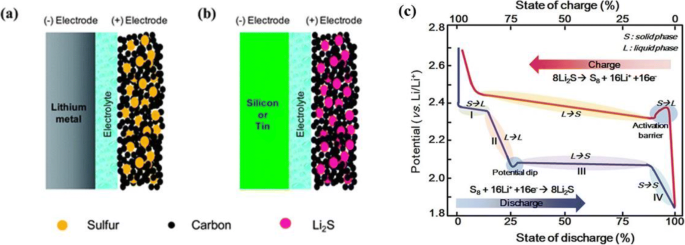 Source: link.springer.com
Source: link.springer.com
However the practical application of lithium-sulfur battery is still greatly impeded by the low Coulombic. A review of biomass materials for advanced lithiumsulfur batteries Huadong Yuan Tiefeng Liu Yujing Liu Jianwei Nai Yao Wang Wenkui Zhang and Xinyong Tao High energy density and low cost make lithiumsulfur LiS batteries famous in the field of energy storage systems. Therefore as an extension of this review we here briefly summarize the progress made when applying encapsulated sulfur in an aqueous electrolyte battery chemistry. A comprehensive review of the current research status and development of the lithium anode in lithium-sulfur battery is presented and discussed. Lithium sulfur battery is one of promising candidates for next-generation energy storage device due to the sulfur cathode material with low cost and nontoxicity and super high theoretical energy density nearly 2600 Wh kg1 6365.
 Source: researchgate.net
Source: researchgate.net
Yet understanding the underlying mechanisms of operation remains a major obstacle to their continued improvement. In the case of using sulfur as the cathode material the configuration of two compartment cell is applied to enable the use of an aqueous electrolyte at the sulfur cathode and an organic electrolyte at the lithium metal anode 245. Lithium-sulfur battery is regarded as one of the promising next-generation energy storage to electrical and portable devices thanks to its extremely high theoretical capacity energy density good environmental protection and low cost. As a prospective nextgeneration energy storage solution lithiumsulfur batteries excel at their economical attractiveness sulfur abundance and electrochemical performance high energy density 2600 Wh kg 1. Yet understanding the underlying mechanisms of operation remains a major obstacle to their continued improvement.
 Source: axial.acs.org
Source: axial.acs.org
Particularly basic insights into the interfacial reactions strategies for mesoscale assembly unique architectures and configurational innovation in the cathode anode and separator are under specific concerns. A review of biomass materials for advanced lithiumsulfur batteries Huadong Yuan Tiefeng Liu Yujing Liu Jianwei Nai Yao Wang Wenkui Zhang and Xinyong Tao High energy density and low cost make lithiumsulfur LiS batteries famous in the field of energy storage systems. Normally lithium-ion batteries contain just 05 to 07 lithium particles per atom while Lithium Sulfur takes into allows a lot higher lithium storage capacity. However some issues such as the low conductivity and the large volume variation of sulfur as well as the formation of polysulfides during cycling are yet to be addressed before LSBs can become an actual reality. The primary difficulties of Lithium Sulfur batteries are the low conductivity of sulfur and its monstrous volume change after discharging.

As a prospective nextgeneration energy storage solution lithiumsulfur batteries excel at their economical attractiveness sulfur abundance and electrochemical performance high energy density 2600 Wh kg 1. Therefore as an extension of this review we here briefly summarize the progress made when applying encapsulated sulfur in an aqueous electrolyte battery chemistry. In the case of using sulfur as the cathode material the configuration of two compartment cell is applied to enable the use of an aqueous electrolyte at the sulfur cathode and an organic electrolyte at the lithium metal anode 245. It has the characteristics of high energy density high theoretical specific capacity affordable cost and environment-friendly. Particularly basic insights into the interfacial reactions strategies for mesoscale assembly unique architectures and configurational innovation in the cathode anode and separator are under specific concerns.
 Source: researchgate.net
Source: researchgate.net
As a prospective nextgeneration energy storage solution lithiumsulfur batteries excel at their economical attractiveness sulfur abundance and electrochemical performance high energy density 2600 Wh kg 1. Lithium sulfur LiS batteries are one of the most promising next generation battery chemistries with potential to achieve 500600 W h kg 1 in the next few years. A comprehensive review of the current research status and development of the lithium anode in lithium-sulfur battery is presented and discussed. Particularly basic insights into the interfacial reactions strategies for mesoscale assembly unique architectures and configurational innovation in the cathode anode and separator are under specific concerns. Yet understanding the underlying mechanisms of operation remains a major obstacle to their continued improvement.

Lithium-sulfur batteries can enable efficient electric transportation such as in unmanned aircrafts electric buses trucks and locomotives in addition to large-scale energy storage devices. Lithium sulfur battery is one of promising candidates for next-generation energy storage device due to the sulfur cathode material with low cost and nontoxicity and super high theoretical energy density nearly 2600 Wh kg1 6365. As a prospective nextgeneration energy storage solution lithiumsulfur batteries excel at their economical attractiveness sulfur abundance and electrochemical performance high energy density 2600 Wh kg 1. In the case of using sulfur as the cathode material the configuration of two compartment cell is applied to enable the use of an aqueous electrolyte at the sulfur cathode and an organic electrolyte at the lithium metal anode 245. Lithium-sulfur batteries can enable efficient electric transportation such as in unmanned aircrafts electric buses trucks and locomotives in addition to large-scale energy storage devices.

Lithiumsulfur LiS batteries have received tremendous attention due to their superior theoretical energy density of 2600 Wh kg 1 as well as the abundance of sulfur resources and its environmental friendlinessPolymer binders as an indispensable component in cathodes play a critical role in maintaining the structural integrity and stability of electrodes. Lithiumsulfur LiS batteries have received a lot of attention as a next-generation energy storage system because of its high theoretical specific energy density of 2500 W h kg 1 and theoretical specific capacity of 1675 mA h g 1 1 3. Lithium-sulfur battery is regarded as one of the promising next-generation energy storage to electrical and portable devices thanks to its extremely high theoretical capacity energy density good environmental protection and low cost. Lithiumsulfur batteries LSBs are regarded as a new kind of energy storage device due to their remarkable theoretical energy density. A comprehensive review of the current research status and development of the lithium anode in lithium-sulfur battery is presented and discussed.
 Source: onlinelibrary.wiley.com
Source: onlinelibrary.wiley.com
I Carbon materials are excellent candidates for sulfur storing in Li S batteries due to their relatively high conductivity and high efficiency in immobilizing polysulfides upon cycling. Lithium sulfur LiS batteries are one of the most promising next generation battery chemistries with potential to achieve 500600 W h kg 1 in the next few years. A comprehensive review of the current research status and development of the lithium anode in lithium-sulfur battery is presented and discussed. Therefore as an extension of this review we here briefly summarize the progress made when applying encapsulated sulfur in an aqueous electrolyte battery chemistry. The primary difficulties of Lithium Sulfur batteries are the low conductivity of sulfur and its monstrous volume change after discharging.
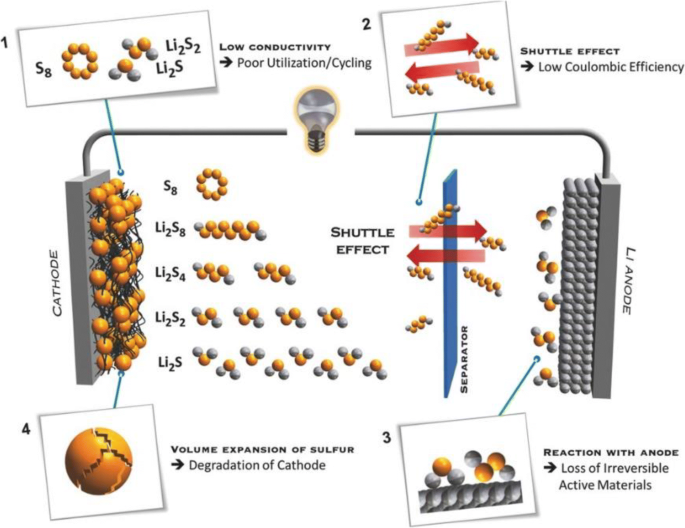 Source: link.springer.com
Source: link.springer.com
Lithium sulfur LiS batteries are one of the most promising next generation battery chemistries with potential to achieve 500600 W h kg 1 in the next few years. Review of progress towards advanced Lithium-sulfur batteries 14 July 2020 Lithium-sulfur Li-S batteries have attracted much attention for its high energy density low cost and environmental. However some issues such as the low conductivity and the large volume variation of sulfur as well as the formation of polysulfides during cycling are yet to be addressed before LSBs can become an actual reality. Lithium sulfur LiS batteries are one of the most promising next generation battery chemistries with potential to achieve 500600 W h kg 1 in the next few years. In the case of using sulfur as the cathode material the configuration of two compartment cell is applied to enable the use of an aqueous electrolyte at the sulfur cathode and an organic electrolyte at the lithium metal anode 245.
 Source: sciencedirect.com
Source: sciencedirect.com
We can summarize this review as the following. Particularly basic insights into the interfacial reactions strategies for mesoscale assembly unique architectures and configurational innovation in the cathode anode and separator are under specific concerns. Lithiumsulfur batteries LSBs are regarded as a new kind of energy storage device due to their remarkable theoretical energy density. Lithiumsulfur LiS batteries have received a lot of attention as a next-generation energy storage system because of its high theoretical specific energy density of 2500 W h kg 1 and theoretical specific capacity of 1675 mA h g 1 1 3. Lithium-sulfur battery is regarded as one of the promising next-generation energy storage to electrical and portable devices thanks to its extremely high theoretical capacity energy density good environmental protection and low cost.
 Source: sciencedirect.com
Source: sciencedirect.com
The primary difficulties of Lithium Sulfur batteries are the low conductivity of sulfur and its monstrous volume change after discharging. Lithiumsulfur LiS batteries have received tremendous attention due to their superior theoretical energy density of 2600 Wh kg 1 as well as the abundance of sulfur resources and its environmental friendlinessPolymer binders as an indispensable component in cathodes play a critical role in maintaining the structural integrity and stability of electrodes. Review of progress towards advanced Lithium-sulfur batteries by World Scientific Publishing Lithium-sulfur Li-S batteries have attracted much attention for its. We can summarize this review as the following. Normally lithium-ion batteries contain just 05 to 07 lithium particles per atom while Lithium Sulfur takes into allows a lot higher lithium storage capacity.
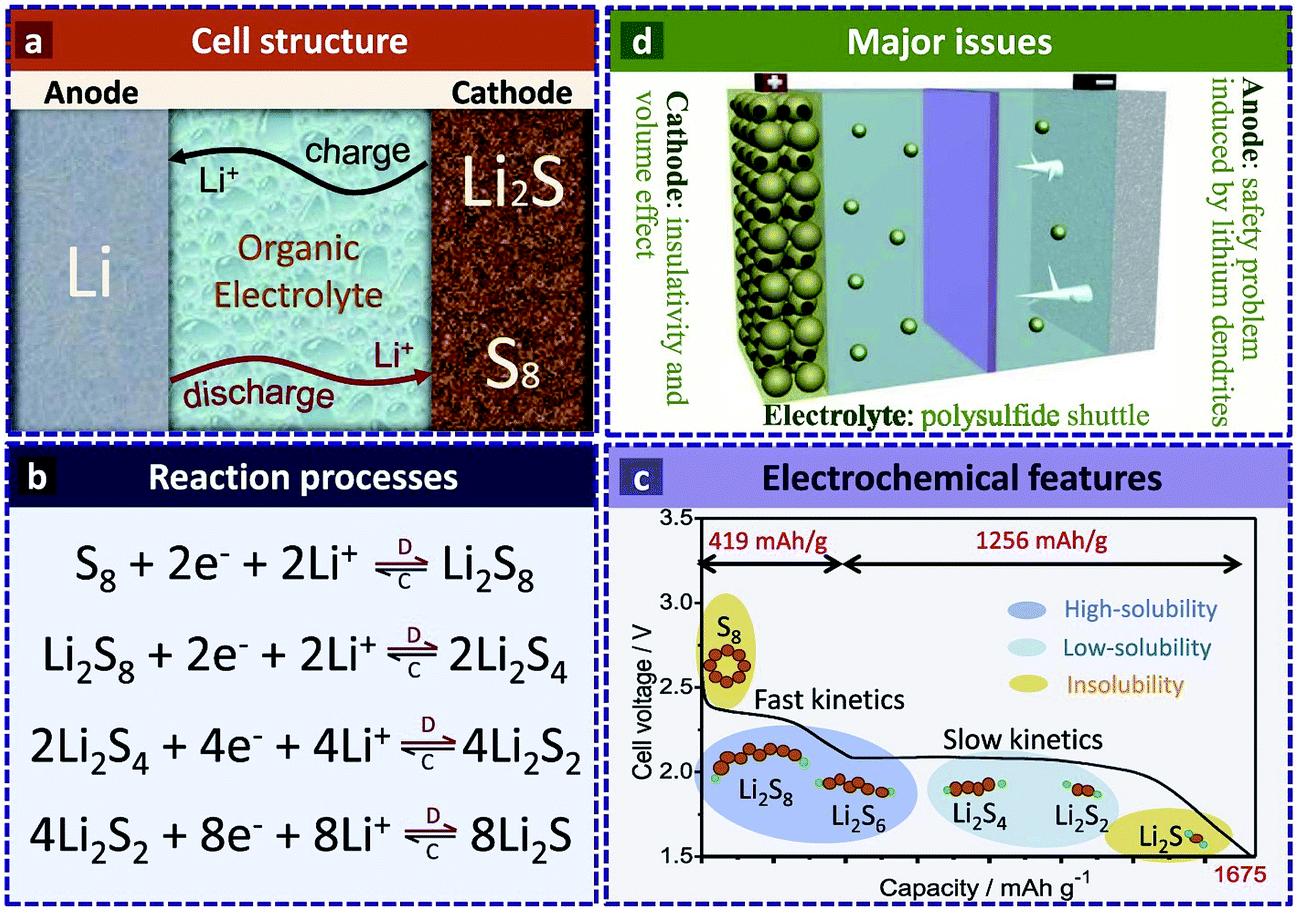 Source: pubs.rsc.org
Source: pubs.rsc.org
A comprehensive review of the current research status and development of the lithium anode in lithium-sulfur battery is presented and discussed. Therefore as an extension of this review we here briefly summarize the progress made when applying encapsulated sulfur in an aqueous electrolyte battery chemistry. However the practical application of lithium-sulfur battery is still greatly impeded by the low Coulombic. I Carbon materials are excellent candidates for sulfur storing in Li S batteries due to their relatively high conductivity and high efficiency in immobilizing polysulfides upon cycling. Lithium sulfur battery is one of promising candidates for next-generation energy storage device due to the sulfur cathode material with low cost and nontoxicity and super high theoretical energy density nearly 2600 Wh kg1 6365.
This site is an open community for users to submit their favorite wallpapers on the internet, all images or pictures in this website are for personal wallpaper use only, it is stricly prohibited to use this wallpaper for commercial purposes, if you are the author and find this image is shared without your permission, please kindly raise a DMCA report to Us.
If you find this site good, please support us by sharing this posts to your own social media accounts like Facebook, Instagram and so on or you can also save this blog page with the title lithium sulfur battery review by using Ctrl + D for devices a laptop with a Windows operating system or Command + D for laptops with an Apple operating system. If you use a smartphone, you can also use the drawer menu of the browser you are using. Whether it’s a Windows, Mac, iOS or Android operating system, you will still be able to bookmark this website.